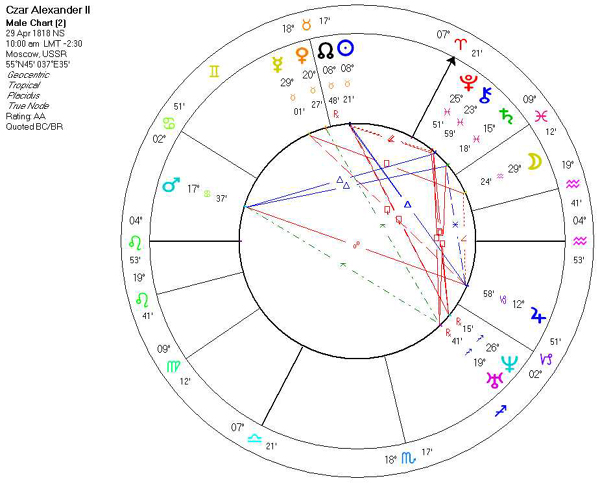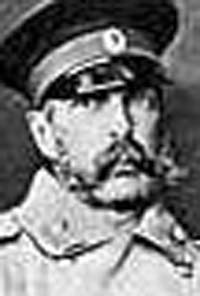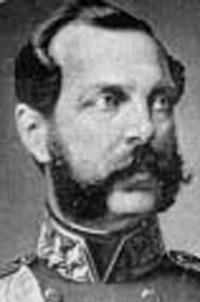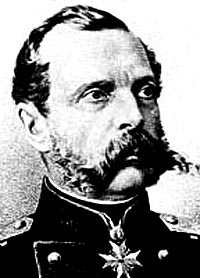Copyright Michael D. Robbins 2005
Astro-Rayological
Interpretation & Charts
Quotes
Biography
Images and Physiognomic Interpretation
QUOTES
It is better to abolish serfdom from above than to wait for it to abolish itself from below.
Alexander III did more for the Russian serf in giving him land as well as personal liberty, than America did for the negro slave set free by the proclamation of President Lincoln. I am at a loss to understand how you Americans could have been so blind as to leave the negro slave without tools to work out his salvation. In giving him personal liberty, you gave him an obligation to perform to the state which he must be unable to fulfill. Without property of any kind he cannot educate himself and his children. I believe the time must come when many will question the manner of American emancipation of the negro slaves in 1863. The vote, in the hands of an ignorant man, without either property or self respect, will be used to the damage of the people at large; for the rich man, without honor or any kind of patriotism, will purchase it, and with it swamp the rights of a free people.
ATTRIBUTION: ALEXANDER II, emperor of Russia, conversation with Wharton Barker, Pavlovski Palace, August 17, 1879.—Barker, “The Secret of Russia’s Friendship,” The Independent, March 24, 1904, p. 647.
Biography of Alexander II, Nikolayevitch
EMPEROR OF ALL RUSSIA 1855-1881
Eldest son of Emperor Nicholas I, Alexander was born in Moscow on April 17, 1818, and came to the throne on February 19, 1855, after the death of his father. He was crowned in Moscow on August 26, 1856.
After his accession to the throne, Alexander II implemented important reforms, notably the abolition of serfdom, changes in national, military and municipal organization. He rethought foreign policy: Russia now refrained from overseas expansion and concentrated on strengthening its borders. In 1867, he sold Alaska and the Aleutian Islands to the United States. His greatest foreign policy achievement was the successful war of 1877-8 against the Ottoman Empire, resulting in the liberation of Bulgaria and annulment of the conditions of the Treaty of Paris of 1856, imposed after Russia's defeat in the Crimean War.
In 1841, Alexander II married Maria of Hessen-Darmstadt (Maria Alexandrovna). The marriage produced seven children.
On March 1, 1881, in St. Petersburg, he was mortally wounded by a bomb thrown by a student, I. Grinevitskii, a member of the revolutionary organization "The National Will.'' The Cathedral of the Resurrection on Blood was erected on the site of the murder. Alexander II was buried in the Cathedral of the St. Peter and St. Paul Fortress in St. Petersburg.
Born the eldest son of Nicholas I of Russia, Alexander's early life gave little indication of his potential, and up to the time of his accession in 1855, few imagined that he would be known to posterity as a great reformer.
Insofar as he had any decided political convictions, he seemed to be imbued with the reactionary spirit predominant in Europe at the time of his birth, and which continued in Russia to the end of his father's reign. In the period of thirty years during which he was heir apparent, the moral atmosphere of St. Petersburg was unfavorable to the development of any originality of thought. Government was based on principles under which all freedom of thought and all private initiative were, as far as possible, suppressed vigorously. Personal and official censorship was rife; criticism of the authorities was regarded as a serious offense.
Alexander received the education commonly given to young Russians of good family at that time: a smattering of a great many subjects, and a good practical acquaintance with the chief modern European language. He took little personal interest in military affairs. To the disappointment of his father, who was passionate about the military, he showed no love of soldiering. Alexander gave evidence of a kind disposition and a tender-heartedness which were considered out of place in one destined to become a military autocrat.
In 1841 he married the daughter of the grand-duke Louis II of Hesse, Maximilienne Wilhelmine Marie, thereafter known as Maria Alexandrovna. The marriage produced six sons and two daughters. Following his wife's death in 1880, Alexander formed a morganatic marriage with his mistress Princess Catherine Dolgoruki. Together they had two sons and two daughters.
Alexander succeeded to the throne upon the death of his father in 1855.
The first year of Alexander's reign was devoted to the prosecution of the Crimean War, and after the fall of Sevastopol to negotiations for peace. Then began a period of radical reforms, encouraged by public opinion but carried out with autocratic power. (The rule of Nicholas, which had sacrificed all other interests to that of making Russia an irresistibly strong military power, had been tried by the Crimean War and found wanting. A new system needed, therefore, to be adopted.) All who had any pretensions to enlightenment declared loudly that the country had been exhausted and humiliated by the war, and that the only way of restoring it to its proper position in Europe was to develop its natural resources and thoroughly to reform all branches of the administration. The government therefore found in the educated classes a new-born public spirit, anxious to assist it in any work of reform that it might think fit to undertake.
Fortunately for Russia the autocratic power was now in the hands of a man who was impressionable enough to be deeply influenced by the spirit of the time, and who had sufficient prudence and practicality to prevent his being carried away by the prevailing excitement into the dangerous region of Utopian dreaming. Unlike some of his predecessors, he had no grand, original schemes of his own to impose by force on unwilling subjects, and no pet projects to lead his judgment astray. He looked instinctively with a suspicious, critical eye upon the panaceas which more imaginative and less cautious people recommended. These character traits, together with the peculiar circumstances in which he was placed, determined the part which he was to play. He moderated, guided and, in great measure, brought to fruition the reform aspirations of the educated classes.
Though he carefully guarded his autocratic rights and privileges, and obstinately resisted all efforts to push him farther than he felt inclined to go, Alexander for several years acted somewhat like a constitutional sovereign of the continental type.
Soon after the conclusion of peace, important changes were made in legislation concerning industry and commerce, and the new freedom thus afforded produced a large number of limited liability companies. At the same time, plans were formed for building a great network of railways—partly for the purpose of developing the natural resources of the country, and partly for the purpose of increasing its power for defense and attack.
Then it was found that further progress was blocked by a formidable obstacle: the existence of serfdom. Alexander showed that, unlike his father, he meant to grapple boldly with this difficult and dangerous problem. Taking advantage of a petition presented by the Polish landed proprietors of the Lithuanian provinces, and hoping that their relations with the serfs might be regulated in a more satisfactory way (meaning in a way more satisfactory for the proprietors), he authorized the formation of committees "for ameliorating the condition of the peasants," and laid down the principles on which the amelioration was to be effected.
This step was followed by one still more significant. Without consulting his ordinary advisers, Alexander ordered the Minister of the Interior to send a circular to the provincial governors of European Russia, containing a copy of the instructions forwarded to the governor-general of Lithuania, praising the supposed generous, patriotic intentions of the Lithuanian landed proprietors, and suggesting that perhaps the landed proprietors of other provinces might express a similar desire. The hint was taken: in all provinces where serfdom existed, emancipation committees were formed.
The deliberations at once raised a host of important, thorny questions. The emancipation was not merely a humanitarian question capable of being solved instantaneously by imperial ukaz (edict). It contained very complicated problems, deeply affecting the economic, social and political future of the nation. The main point at issue was whether the serfs should become agricultural laborers dependent economically and administratively on the landlords, or whether they should be transformed into a class of independent communal proprietors. The emperor gave his support to the latter project, and the Russian peasantry accordingly acquired rights and privileges such as were enjoyed by no other peasantry in Europe.
On March 3, 1861, the sixth anniversary of his accession, the emancipation law was signed and published. Other reforms followed in quick succession during the next five or six years: army and navy re-organization; a new judicial administration based on the French model; a new penal code and a greatly simplified system of civil and criminal procedure; an elaborate scheme of local self-government for the rural districts and the large towns, with elective assemblies possessing a restricted right of taxation, and a new rural and municipal police under the direction of the Minister of the Interior.
These new institutions were incomparably better than the ones which they replaced, but they did not work such miracles as the inexperienced enthusiasts expected. Comparisons were made, not with the past, but with an ideal state of things which never existed, either in Russia or elsewhere. Hence arose a general feeling of disappointment, which acted on differently-minded people in different ways.
For some years Alexander, with his sound common-sense and dislike of exaggeration, held the balance fairly between the two extremes; but long years of uninterrupted labor, anxiety and disappointment weakened his zeal for reform, and when radicalism began to resort to the formation of secret societies and to revolutionary agitation, he felt constrained to adopt severe repressive measures.
Alexander II resolved to try the effect of some moderate liberal reforms in an attempt to quell the revolutionary agitation, and for this purpose he caused an ukaz to be prepared creating special commissions, composed of high officials and private personages who should prepare reforms in various branches of the administration.
At the beginning of his reign, Alexander expressed the famous statement "No dreams" addressed for Poles, populating Congress Poland, Western Ukraine, Lithuania, Livonia and Belorus. The result was January Uprising that were suppressed after 1.5 years of fighting. Thousand Poles were executed, tens of thousands were deported to Siberia.
The price for suppression was Russian support for Prussian-united Germany. Twenty years later, Germany became the major enemy of Russia on continent.
All teritories of the former Poland-Lithuania were eluded from liberal polices introduced by Alexander. The martial law in Lithuania, introduced in 1863 lasted for 50 next years. Native languages, Lithuanian, Ukrainian and Belorussian were completely banned from printing texts, Polish were banned both oral and written from the all provinces except Congress Kingdom.
Assassination
On the very day on which this decree was signed—March 13, 1881—he fell victim to a Nihilist plot. While driving on one of the central streets of St. Petersburg, near the Winter Palace, he was mortally wounded by the explosion of hand-made grenades and died a few hours afterwards. The assassination was carried out by the radical revolutionary group Narodnaya Volya (People's Will) which hoped to ignite a social revolution. The members Nikolai Kibalchich, Sophia Perovskaya, Nikolai Rysakov, Timofei Mikhailov, Andrei Zhelyabov were arrested and sentenced to death. Gesya Gelfman was sent to Siberia. The Tsar was killed by the Pole Ignacy Hryniewiecki (1856-1881), who died during the attack. Hryniewiecki was a Pole from Lithuania (Bobrujsk, now Babruysk, Belarus), where suppression of Poles and persecutions were the harshest. It included complete ban on Polish langauge in public places, schools and offices.
On the site where he was wounded, the Cathedral of the Resurrection on Blood was erected.
____________________
Alexander, the eldest son of Tsar Nicholas I, was born in Moscow on 17th April, 1818. Educated by private tutors, he also had to endure rigorous military training that permanently damaged his health.
In 1841 he married Marie Alexandrovna, the daughter of the Grand Duke of Hesse-Darmstadt. Alexander became Tsar of Russia on the death of his father in 1855. At the time Russia was involved in the Crimean War and in 1856 signed the Treaty of Paris that brought the conflict to an end.
The Crimean War made Alexander realize that Russia was no longer a great military power. His advisers argued that Russia's serf-based economy could no longer compete with industrialized nations such as Britain and France.
Alexander now began to consider the possibility of bringing an end to serfdom in Russia. The nobility objected to this move but as Alexander told a group of Moscow nobles: "It is better to abolish serfdom from above than to wait for the time when it will begin to abolish itself from below.
In 1861 Alexander issued his Emancipation Manifesto that proposed 17 legislative acts that would free the serfs in Russia. Alexander announced that personal serfdom would be abolished and all peasants would be able to buy land from their landlords. The State would advance the the money to the landlords and would recover it from the peasants in 49 annual sums known as redemption payments.
Alexander also introduced other reforms and in 1864 he allowed each district to set up a Zemstvo. These were local councils with powers to provide roads, schools and medical services. However, the right to elect members was restricted to the wealthy.
Other reforms introduced by Alexander included improved municipal government (1870) and universal military training (1874). He also encouraged the expansion of industry and the railway network.
Alexander's reforms did not satisfy liberals and radicals who wanted a parliamentary democracy and the freedom of expression that was enjoyed in the United States and most other European states. The reforms in agricultural also disappointed the peasants. In some regions it took peasants nearly 20 years to obtain their land. Many were forced to pay more than the land was worth and others were given inadequate amounts for their needs.
In 1876 a group of reformers established Land and Liberty. As it was illegal to criticize the Russian government, the group had to hold its meetings in secret. Influenced by the ideas of Mikhail Bakunin, the group published literature demanding that Russia's land should be handed over to the peasants.
Some reformers favoured a policy of terrorism to obtain reform and on 14th April, 1879, Alexander Soloviev, a former schoolteacher, tried to kill Alexander. His attempt failed and he was executed the following month. So also were sixteen other men suspected of terrorism.
The government responded to the assassination attempt by appointing six military governor-generals that imposed a rigorous system of censorship on Russia. All radical books were banned and known reformers were arrested and imprisoned.
In October, 1879, the Land and Liberty split into two factions. The majority of members, who favoured a policy of terrorism, established the People's Will. Soon afterwards the group decided to assassinate Alexander. The following month Andrei Zhelyabov and Sophia Perovskaya used nitroglycerine to destroy the Tsar train. However, the terrorist miscalculated and it destroyed another train instead. An attempt the blow up the Kamenny Bridge in St. Petersburg as the Tsar was passing over it was also unsuccessful.
The next attempt on Alexander's life involved a carpenter, Stefan Khalturin, who had managed to find work in the Winter Palace. Allowed to sleep on the premises, each day he brought packets of dynamite into his room and concealed it in his bedding.
On 17th February, 1880, Khalturin constructed a mine in the basement of the building under the dinning-room. The mine went off at half-past six at the time that the People's Will had calculated Alexander would be having his dinner. However, his main guest, Prince Alexander of Battenburg, had arrived late and dinner was delayed and the dinning-room was empty. Alexander was unharmed but sixty-seven people were killed or badly wounded by the explosion.
The People's Will contacted the Russian government and claimed they would call off the terror campaign if the Russian people were granted a constitution that provided free elections and an end to censorship. On 25th February, 1880, Alexander announced that he was considering granting the Russian people a constitution. To show his good will a number of political prisoners were released from prison. Loris Melikof, the Minister of the Interior, was given the task of devising a constitution that would satisfy the reformers but at the same time preserve the powers of the autocracy.
At the same time the Russian Police Department established a special section that dealt with internal security. This unit eventually became known as the Okhrana. Under the control of Loris Melikof, the Minister of the Interior, undercover agents began joining political organizations that were campaigning for social reform.
In January, 1881, Loris Melikof presented his plans to Alexander. They included an expansion of the powers of the Zemstvo. Under his plan, each zemstov would also have the power to send delegates to a national assembly called the Gosudarstvenny Soviet that would have the power to initiate legislation. Alexander was concerned that the plan would give too much power to the national assembly and appointed a committee to look at the scheme in more detail.
The People's Will became increasingly angry at the failure of the Russian government to announce details of the new constitution. They therefore began to make plans for another assassination attempt. Those involved in the plot included Sophia Perovskaya, Andrei Zhelyabov, Gesia Gelfman, Nikolai Sablin, Ignatei Grinevitski, Nikolai Kibalchich, Nikolai Rysakov and Timofei Mikhailov.
In February, 1881, the Okhrana discovered that their was a plot led by Andrei Zhelyabov to kill Alexander. Zhelyabov was arrested but refused to provide any information on the conspiracy. He confidently told the police that nothing they could do would save the life of the Tsar.
On 1st March, 1881, Alexander was travelling in a closed carriage, from Michaelovsky Palace to the Winter Palace in St. Petersburg. An armed Cossack sat with the coach-driver and another six Cossacks followed on horseback. Behind them came a group of police officers in sledges.
All along the route he was watched by members of the People's Will. On a street corner near the Catherine Canal Sophia Perovskaya gave the signal to Nikolai Rysakov and Timofei Mikhailov to throw their bombs at the Tsar's carriage. The bombs missed the carriage and instead landed amongst the Cossacks. The Tsar was unhurt but insisted on getting out of the carriage to check the condition of the injured men. While he was standing with the wounded Cossacks another terrorist, Ignatei Grinevitski, threw his bomb. Alexander was killed instantly and the explosion was so great that Grinevitski also died from the bomb blast.
Of the other conspirators, Nikolai Sablin committed suicide before he could be arrested and Gesia Gelfman died in prison. Sophia Perovskaya, Andrei Zhelyabov, Nikolai Kibalchich, Nikolai Rysakov and Timofei Mikhailov were hanged on 3rd April, 1881.
In February, 1881, Melikoff reported that a new plot had been laid by the Revolutionary Executive Committee, but its plan could not be discovered by any amount of searching. Thereupon Alexander II decided that a sort of deliberative assembly of delegates from the provinces should be called. Always under the idea that he would share the fate of Louis XVI, he described this gathering as an assembly of notables, like the one convoked by Louis XVI before the National Assembly in 1789. The scheme had to be laid before the Council of State, but then again he hesitated. It was only on the morning of March 1 (13), 1881, after a final warning by Loris Melikoff, that he ordered it to be brought before the council on the following Thursday. This was on Sunday, and he was asked by Melikoff not to go out to the parade that day, there being danger of an attempt on his life. Nevertheless he went. He wanted to see the Grand Duchess Catherine, and to carry her the welcome news. He is reported to have told her, "I have determined to summon an assembly of notables." However, this belated and half-hearted concession had not been made public, and on his way back to the Winter Palace he was killed.
It is known how it happened. A bomb was thrown under his iron-clad carriage to stop it. Several Circassians of the escort were wounded. Rysakoff, who flung the bomb, was arrested on the spot. Then, although the coachman of the Tsar earnestly advised him not to get out, saying that he could drive him still in the slightly damaged carriage, he insisted upon alighting. He felt that his military dignity required him to see the wounded Circassians, to condole with them as he had done with the wounded during the Turkish war, when a mad storming of Plevna, doomed to end in a terrible disaster, was made on the day of his fête. He approached Rysakoff and asked him something; and as he passed close by another young man, Grinevetsky, the latter threw a bomb between himself and Alexander II, so that both of them should be killed. They both lived but a few hours.
There Alexander II lay upon the snow, profusely bleeding, abandoned by every one of his followers. All had disappeared. It was cadets, returning from the parade, who lifted the suffering Tsar from the snow and put him in a sledge, covering his shivering body with a cadet mantle and his bare head with a cadet cap. And it was one of the terrorists, Emelianoff, with a bomb wrapped in a paper under his arm, who, at the risk of being arrested on the spot and hanged, rushed with the cadets to the help of the wounded man. Human nature is full of those contrasts.
Thus ended the tragedy of Alexander II's life. People could not understand how it was possible that a Tsar who had done so much for Russia should have met his death at the hands of revolutionists. To me, who had the chance of witnessing the first reactionary steps of Alexander II, and his gradual deterioration, who had caught a glimpse of his complex personality, -- that of a born autocrat whose violence was but partially mitigated by education, of a man possessed of military gallantry, but devoid of the courage of the statesman, of a man of strong passions and weak will -- it seemed that the tragedy developed with the unavoidable fatality of one of Shakespeare's dramas. Its last act was already written for me on the day when I heard him address us, the promoted officers, on June 13, 1862, immediately after he had ordered the first executions in Poland.



